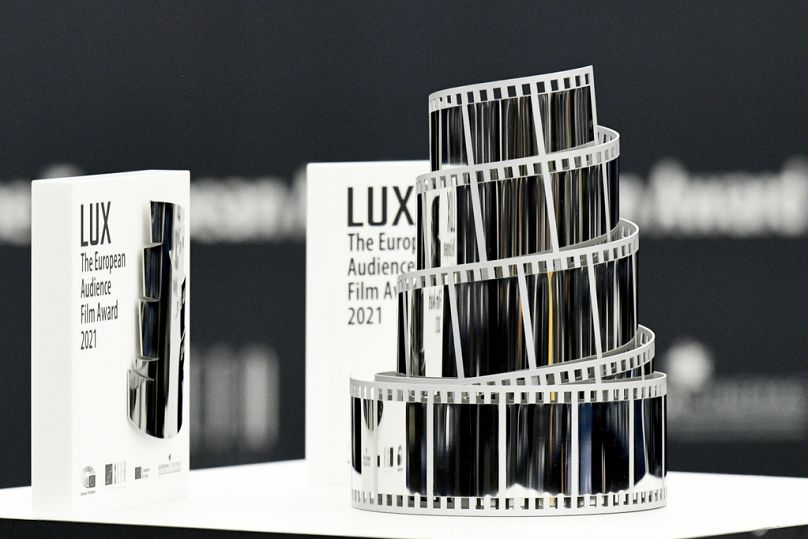"This is an award, most of all, for the victims and the families for whom justice has still not been served in Romania five years later," said director Alexander Nanau
A film about the role of corruption in Romania's deadliest fire has been recognised by the European Parliament.
The documentary Collective (Colectiv) won the LUX Audience Award, which is chosen by MEPs and member of the public.
The Oscar-nominated film, directed by Alexander Nanau, depicts the aftermath of the Colectiv nightclub fire, which took place in Bucharest in October 2015. The blaze killed 64 people, injured more than 140 and led to mass protests.
Collective explores the work of investigative journalists trying to expose the country's corruption, maladministration and public fraud.
The movie has been praised and collected numerous awards around the world. Earlier this year, it became a rare double nominee at the Academy Awards, for best documentary and best foreign film, although it won neither.
"Collective" competed alongside the Polish religious drama Corpus Christi ("Boże Ciało"), by Jan Komasa, which was ranked second, and the Oscar-winning Danish film Another Round ("Druk"), by Thomas Vinterberg, which came third.
The LUX Audience Award is a joint initiative by the European Parliament and the European Film Academy (EFA) in partnership with the European Commission and Europa Cinemas. A panel headed by EFA's chairman Mike Downey selected the three finalists, which were announced in December.
For the first time, the winner was chosen by combining the votes from the public and MEPs. Online voting closed in late May after several months of public screenings across Europe.
The three movies were subtitled into all the official EU languages.
'An extraordinary testimony'
The prize was awarded on Wednesday afternoon during the plenary in Strasbourg.
European Parliament President David Sassoli said the culture sector had been hit hard by the coronavirus pandemic and the LUX Audience Award helped to send a message of optimism in the context of the economic reopening and the vaccination campaign. Sassoli described Collective as an "extraordinary testimony of investigative journalism".
Picking up the LUX award, director Alexander Nanau paid tribute to his fellow citizens.
"This is an award, most of all, for the victims and the families for whom justice has still not been served in Romania five years later. There was no compensation, nobody has yet been found guilty. It's not happening in Belarus, it's happening in Romania," Nanau said.
"This is also an award for the resilience and the courage of normal citizens that came out, told the truth and changed Romania's society in 2016. Because they had the courage to go to the press and tell the truth, and because we had independent journalists who stood up for their values and informed the public, we learned about the real state of the Romanian healthcare system that pretends to be functioning when instead it was not able to treat these burnt patients."
Nanau said Romania had been saved when it joined the European Union and urged MEPs to protect the culture sector and journalism inside the country.
"It was the European Union that rescued basically the country by its mechanisms of protecting the rule of law, but societies do not evolve if we do not have culture, education and a free press," he remarked.
"It's not an accident that, in many countries, culture and education [are] not only underfunded but systematically prevented from flavouring. Only culture can bring us together."
The LUX Audience Award ceremony was short and sober, with most of the hemicycle empty due to the health crisis.
The solemn atmosphere was briefly interrupted by actor Bartosz Bielenia, representative of "Corpus Christi", who shouted three times to show solidarity with the Belarusian opposition movement.
This year's LUX ceremony coincided with the 30th anniversary of the EU's Creative Europe programme, which has invested €2.6 billion in the film and audiovisual industries since 1991. All the three nominees received some amount of funding from the bloc.
"We need to ensure that we have a film industry that both has strong experienced directors, but also caters to young talent who are moving up, which is very hard, and can only be done with public funds because film is a very bad business for most people involved," Kasper Dissing, producer of "Another Round", told Euronews.
"It is a good business for society and for culture, but for the people involved it is rarely a good business. So, we need the public funds to keep developing talent."
The European Parliament launched the LUX Prize in 2007 with the aim of supporting the production and distribution of European films. The award is meant to reflect current political and social issues, as well as to celebrate European culture.
Some of the previous LUX winners and nominees are already considered film classics of the 21st century, such as Mysteries of Lisbon (Portugal), Toni Erdmann (Germany), The Great Beauty (Italy), 4 Months, 3 Weeks and 2 Days (Romania), Force Majeure (Sweden) and Son of Saul (Hungary).












